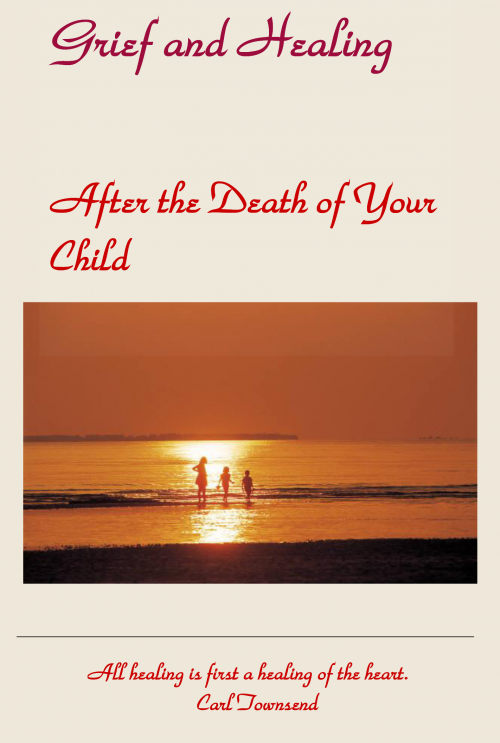
New parents are surprised by how a child fills their lives. Besides the incredible day-to-day duties of parenthood, the child becomes someone the parent expects to be present throughout the rest of the parent’s life. A parent never again envisions any important event without including the child. I once took part in a workshop exercise that asked, “Imagine it is your birthday and also the day that you will die. How old would you be and who would be present?” My answers were 85 years old, and my son Greg, who was 1 at the time.
This reality of parenthood leads parents of all ages who have to face the death of their children at any age to feel it is simply unnatural for the parent to outlive the child. Yet that is where you find yourself today. Your beloved child is gone before even having much of a chance to build a life in this world. However, even a baby establishes a unique presence and personality. A youngster of any age is a bundle of potential, a growing and learning dynamo developing toward maturity and independence.
When a child dies, the currently empty arms and broken hearts are accompanied by visions of a seemingly empty future and broken dreams for a lifetime.

The death of one’s child can call into question the parent’s performance of a most important duty, that of protecting the child. Intellectually, the parent probably understands the circumstances of the death were not a reflection upon the parent’s commitment or competence. Others may try to impress upon you that you shouldn’t feel any guilt or regret about your parenting. Yet the death stands as a stark reminder that you were not able to prevent this tragic outcome.
Parents may review over and over what happened, what was done or not done, said or not said, noticed or not noticed, acted upon or ignored. All with the perspective of knowing how things actually turned out. Many feel a deep emotional longing to turn back time so there could be a second chance with a happier ending.
This longing is a normal part of grieving for most people. When the future is suddenly and grossly turned into a shadow into which you really don’t want to go, clinging to the past for awhile may be the only way to keep a grip on life long enough for the shadow to lift a bit. During this time what helps most is loving, compassionate support for the parent, often in the form of extensive, patient listening and a quiet presence that reassures the parent without arguing with or judging the parent’s thoughts and feelings.
Sometimes spouses and family members can support each other this way. However, their own sorrow may be so consuming and their desire not to add to each other’s burden may be so great as to get in the way of being able to support one another. Friends, spiritual leaders, counselors and support groups can provide a caring, objective, emotionally safe place to deal with the real experience of grief.

Children usually don’t leave much behind to remind us they were here. They haven’t completed an education, established themselves in a career, had a family or created lasting monuments to their lives. If they are to live on in this world, it will be in the memories of their parents and others who witnessed their lives. In the harsh pain of grief, it may be very hard to deal with reminders of the child, since they are also reminders of the child’s death. At the same time, parents may almost enshrine the child with many photos on display, bedrooms preserved as left by the child, toys, clothes and athletic gear kept in sight. Mementos and photographs can be very important as parents remember the child and tell the story of the child’s life throughout the rest of their lives. Though not in the way expected, the child will be present the rest of the parent’s life. In each significant event, the parent will carry the memories and wonder what it would be like if the child could take part. A mixture of sadness about the child’s absence and gratitude for treasured memories are likely to come out again and again.

Marital strains are not uncommon when a child has died. Grieving is such an intense personal experience that even the closest of partners cannot share it. The emotional capability to stand beside your mate supportively can be compromised by the absorption of your emotional energy in your own grief. Finding healthy sources of personal support can help each partner just to share love and compassion for the other. That may allow them to focus for awhile on cooperating on practical needs of the family while healing occurs. Counseling and educational or support programs for grieving people can be very valuable in keeping couples and families intact after a child dies.
Many grieving parents are dismayed that others do not mention their loss nor say the name of their child. Some folks innocently believe that not bringing up the subject will spare the parent some distress. While some parents don’t want to talk about it, many say that acknowledging their loss and especially saying the child’s name are very important to them. Because the child had so little time in our world, parents can feel the best way to validate the child’s life is to repeat the child’s name and talk about the child’s life – and death – as often as possible.

Your child had a name, a unique personality and special talents and unfulfilled potential that built dreams you cherished. The rest of your life, you will bear witness with gratitude for the life of your child. This child will always be your child and you will always be your child’s parent.


